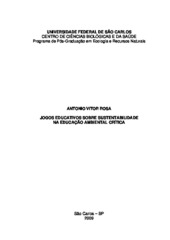Jogos educativos sobre sustentabilidade na educação ambiental crítica
Resumo
This study, which falls within the category of exploratory research, had the following aims: a) to identify the main elements of the educational approach of socio-environmental sustainability according to the Critical Environmental Education perspective; b) to review the state of the art of educational games related to Environmental Education; c) to identify the limits and possibilities for the design and use of educational games that approach the theme of sustainability in the Critical Environmental Education perspective. A set of stages and procedures were developed based on the multi-referentiality methodology, the main ones being: a) demarcation and contextualization of the terms Critical Environmental Education , games , and sustainability ; b) survey and discussion of researches that focus on educational games; c) survey of the main aspects considered important in educational processes dealing with sustainability; d) survey and characterization of the actual games designed for Environmental Education; e) survey and analysis of table games (educational or not) and identification of their mechanics and other features; f) formulation of four proposals for educational games; g) carrying out of pretest workshops for the games created; h) reflections linking the experiences of both the proposals and pretests with the theoretical references on educational games and Critical Environmental Education. It was possible to verify that the use of games has a great educational potential and offer several possible perspectives, themes, plots, types, and mechanisms. Furthermore, the fact that games can provide a parallel world, without limits for creativity and experience, converges to the purpose of discussing the development of sustainable societies. However, practically none of those aspects is explored by most of the existing games related to Environmental Education, which have a poor level of education contribution, lack critical references, and usually provide few opportunities for a significant socio-environmental learning experience. The surveys that were carried out indicate that there is little production and use of games in Environmental Education. One of the main difficulties for developing such games, especially the simulation ones, is the incompatibility between the enormous complexity of the concept of sustainability and the need for making choices and formulating models with extreme simplifications, which is in opposition to the goals of Critical Environmental Education. It was noted that it is very difficult to conciliate educational goals with playability while designing games that approach complex themes.
